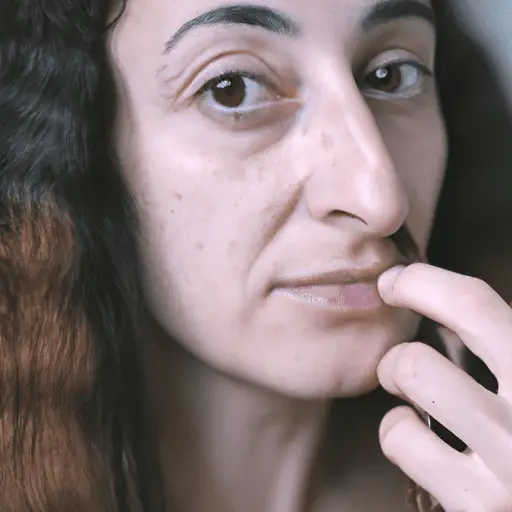Understanding Excessive Facial Hair in Women: Causes and Solutions
-
Table of Contents
- Understanding Excessive Facial Hair in Women: Causes and Solutions
- Key Takeaways
- Introduction: Unraveling the Mystery of Excessive Facial Hair in Women
- The Underlying Causes of Hirsutism
- Treatment Options for Hirsutism
- The Psychological Impact of Hirsutism
- FAQ Section
- What is hirsutism?
- What causes hirsutism?
- How is hirsutism treated?
- Can hirsutism be cured?
- What is the psychological impact of hirsutism?
- Conclusion: Understanding and Managing Hirsutism
- Key Takeaways Revisited
Understanding Excessive Facial Hair in Women: Causes and Solutions

[youtubomatic_search]
Key Takeaways
- Excessive facial hair in women, also known as hirsutism, is a common condition often caused by hormonal imbalances.
- Polycystic ovary syndrome (PCOS) is a common cause of hirsutism.
- There are various treatment options available, including medication, lifestyle changes, and cosmetic procedures.
- Psychological support may be necessary as hirsutism can lead to emotional distress.
- Early diagnosis and treatment can help manage the condition and improve quality of life.
Introduction: Unraveling the Mystery of Excessive Facial Hair in Women
Excessive facial hair in women, medically known as hirsutism, is a condition that affects approximately 5-10% of women of reproductive age. It is characterized by the growth of coarse, dark hair in areas where men typically grow hair, such as the face, chest, and back. This article aims to shed light on the causes of hirsutism and explore the various treatment options available.
The Underlying Causes of Hirsutism
The primary cause of hirsutism is an overproduction of androgens, male hormones that are present in both men and women. Conditions such as polycystic ovary syndrome (PCOS), adrenal gland disorders, and certain medications can lead to an increase in androgen levels, resulting in hirsutism.
PCOS is the most common cause of hirsutism, affecting approximately 70% of women with the condition. It is characterized by an imbalance in female sex hormones, which can lead to irregular periods, obesity, infertility, and excessive hair growth.
Treatment Options for Hirsutism
Treatment for hirsutism focuses on managing the underlying cause and reducing hair growth. Medications such as oral contraceptives and anti-androgens can help balance hormone levels and reduce hair growth. Lifestyle changes, including a healthy diet and regular exercise, can also help manage symptoms.
Cosmetic procedures such as laser hair removal and electrolysis can provide more immediate results. However, these treatments can be expensive and may require multiple sessions.
The Psychological Impact of Hirsutism
Hirsutism can have a significant psychological impact, leading to feelings of embarrassment, anxiety, and depression. It is important for women with hirsutism to seek psychological support if needed. Support groups and counseling can provide a safe space to share experiences and coping strategies.
FAQ Section
What is hirsutism?
Hirsutism is a condition characterized by excessive hair growth in women in areas where men typically grow hair, such as the face, chest, and back.
What causes hirsutism?
Hirsutism is primarily caused by an overproduction of androgens, male hormones that are present in both men and women. Conditions such as polycystic ovary syndrome (PCOS), adrenal gland disorders, and certain medications can lead to an increase in androgen levels.
How is hirsutism treated?
Treatment for hirsutism focuses on managing the underlying cause and reducing hair growth. This can include medication, lifestyle changes, and cosmetic procedures.
Can hirsutism be cured?
While there is no cure for hirsutism, the condition can be effectively managed with treatment. Early diagnosis and treatment can help manage symptoms and improve quality of life.
What is the psychological impact of hirsutism?
Hirsutism can lead to feelings of embarrassment, anxiety, and depression. Psychological support, including support groups and counseling, can be beneficial.
Conclusion: Understanding and Managing Hirsutism
Excessive facial hair in women, or hirsutism, is a common condition often caused by hormonal imbalances. While it can have a significant psychological impact, there are various treatment options available that can help manage the condition and improve quality of life. By understanding the causes of hirsutism and seeking early treatment, women with the condition can lead fulfilling lives.
Key Takeaways Revisited
- Hirsutism is a common condition often caused by hormonal imbalances.
- Polycystic ovary syndrome (PCOS) is a common cause of hirsutism.
- Various treatment options are available, including medication, lifestyle changes, and cosmetic procedures.
- Hirsutism can lead to emotional distress, making psychological support necessary.
- Early diagnosis and treatment can help manage hirsutism and improve quality of life.
[youtubomatic_search]


